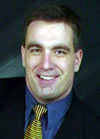Trust Amid Life's Travels
 Author’s Note: For the past nine months, I have been consumed with the vision of planting a church in downtown Denver. This vision has called me and my family to a life of travel, a part-time job, and constant change. As the owner of SI, I have felt detached from the site I started almost three years ago. I appreciate the crew that has pinch-hit for me. For the next week, I’d like to update you on what God has been showing me over the past nine months. I will do so by publishing some articles that I wrote for our prayer partners.
Author’s Note: For the past nine months, I have been consumed with the vision of planting a church in downtown Denver. This vision has called me and my family to a life of travel, a part-time job, and constant change. As the owner of SI, I have felt detached from the site I started almost three years ago. I appreciate the crew that has pinch-hit for me. For the next week, I’d like to update you on what God has been showing me over the past nine months. I will do so by publishing some articles that I wrote for our prayer partners.
Proverbs 3:5-6—”Trust in the LORD with all thine heart; and lean not unto thine own understanding. In all thy ways acknowledge him, and he shall direct thy paths” (KJV).
If you’re like me, you have heard these verses in church since the elderly woman was holding you in a rocking chair in the nursery. That familiarity can be a problem. “Old” truths can become commonplace, trite, and part of Christian cliché. However, these truths have pierced me as a thirty-four-year-old pastor. Let me explain. The verse starts out by saying “trust in the LORD with all thine heart.” What does it mean to trust in the Lord? D.A. Carson says, “Trust and lean both suggest the physical experience of supporting yourself on something or someone in total and helpless reliance and commitment.” In Warren Wiersbe’s book, Be Skillful, he defines it as “to lie helpless, facedown.” This term carries with it the picture of a defeated soldier yielding himself to the conquering general. In other words, trust is not something you add to your own ability. It replaces your ability and your strength.
We have a problem though. We were born trusting in our own understanding. Trusting in God is as foreign to humans as it would be for a fish to try to live on land. The fish panics because he is out of his natural environment and will not survive long. We tend to think the same way about trusting in Someone besides ourself. The natural state of our humanity pulls us to self-reliance. One commentator said, “Do not seek to be independent of God.” I don’t think he understands the human heart. We do not seek to be independent of God; independence is the natural pull of the human heart. The problem with human wisdom, though, is that it makes sense to humans. It’s logical. It has proven to be true in many circumstances. It’s why the Church Growth Movement is lethal. It makes total sense when you hear it, but that is not how God works.
Human wisdom is all around us—Dr. Phil, Oprah, Joel Osteen, and others. Sadly, many good Christians regularly dispense this type of wisdom. On deputation, we have received much advice on how to raise money from those who have done so. However, it is usually a story about what worked or did not work for them. When they are finished, I find myself trusting or leaning toward trying their method or plan. And believe me, when you are trying to raise support, you will take any plan that sounds like it will work! When under pressure, you start coming up with alternative plans. We usually term them something like “Plan B” and “Plan C.” However, when you study how God works, you begin to realize that His ways often do not make sense. He delights in turning “Plan B’s” into disasters. His ways usually do not seem logical to human minds. Just read the Sermon on the Mount. Christ’s words turn earthly wisdom on its head.
I believe we depend on human wisdom more than we know. The Bible talks of even the great men in Scripture who relied on their human understanding. Abraham did so when he went down to Egypt during the famine (Gen. 12). Joshua trusted in common sense when he attacked Ai (Josh. 7). David relied on his wisdom in numbering the people (1 Chron. 21). If you read all of these stories, you are hit with the obvious—all of their decisions made sense! But none of them were doing what God wanted. When it comes to finances, rearing of children, and employment choices, human wisdom is as close as the remote control. When it comes to church, I’m afraid many church leadership meetings are packed with our own understanding. Budget talks can be rife with human wisdom. This tendency is not just a mistake. It is Christian treason. We are throwing our allegiance to the wrong side. You might say, “Doesn’t God give us wisdom and common sense?” Yes, trusting in God is not checking our brains at the door, but it’s a matter of where our trust lies.
So how can you tell where your trust lies in Christian decision making? One tangible way to gauge our trust level is to simply examine our prayer lives. The very act of a prayer is a declaration of the fact that our trust is elsewhere. Prayer admits that we need Someone greater than ourselves. Prayer aligns the heart and calms the soul as it submits to the power and wisdom of God. In your private life, how much time is devoted to prayer? In church services or leadership meetings, is prayer viewed as simply the “nod to God” at the beginning of the meeting, or does it take up a good portion of the time?
Another way to measure your trust factor is to take stock of how much you complain. I have been convicted about my complaining spirit. Going on deputation seems to put you in the path that yields itself to grumpiness. In July, our van got stuck at a Bible camp. When someone towed the van, a large rock under the van (unseen by us) bent the drive shaft and tore up the muffler. In August, we blew a tire while going seventy-five down an Arizona freeway. Travel began taking its toll on all of us. I vented often. Mostly to God, then to my wife. However, reading a book by the Puritan John Flavel on the providence of God sent me reeling and repenting. He talks about when we get to heaven. When we see the hand of God in our affairs, how differently we will look at life’s problems. He says, “All the dark, intricate, puzzling providences at which we were sometimes so offended, and sometimes amazed, which we could neither reconcile with the promise nor with each other, nay, which we so unjustly censured and bitterly bewailed, as if they had fallen out quite against our happiness, we shall then see to be to us, as the difficult passage through the wilderness was to Israel, ‘the right way to the city of habitation’ (Ps. 107:7).” There is no need to complain when we trust that everything in our lives comes from the hand of God and is designed for our good.
So how has God been teaching me to lean on His wisdom? The first way is to deal with the fact that I have an idea of how the church is going to come about, yet God probably has a completely different plan. I need to follow His providence, not force my timeline. I must listen, pray, and trust and then watch Him work. Second, I need to pray more. Prayer has a way of getting my idolatrous heart to bow before Someone greater. I am prone to wander. I am prone to trust in the flesh. The very act of prayer is self-crucifying. Third, I must realize that His plan in building a great church starts with building great lives, not with a nice prospectus. How does He build great men and women? Usually through suffering and pain. I have to realize He is far more concerned right now about putting steel in the backbone of my wife and me than about what Providence Bible Church is going to look like.
Our wisdom doesn’t work because it’s not how God works. God delights in turning human wisdom on its ear and seeing the glory go to Him. God gets glory when 5,000 are fed from a small loaf of bread and some fish. He is praised when three hundred men put an army of thousands to flight. He is exalted when a monotone sermon sparks a Great Awakening. God’s ways are different than our ways. His wisdom and knowledge are far deeper than human wisdom. His ways are past finding out. We are learning to trust in Him. He promises to direct our paths. And we are experiencing that His will is often down different roads and to different places than we would normally travel.
 Jason Janz, SharperIron site publisher, is planting Providence Bible Church in downtown Denver. Formerly, he served as an assistant pastor at Red Rocks Baptist Church (Morrison, CO). He has a bachelor’s degree in Bible and is currently finishing a master’s degree in theology. He has been married to Jennifer for 10 years, and they have four boys. His interests include pastoring, reading, and wrestling with his boys. He likes SI because of how it helps serve pastors and church leaders. Jason Janz, SharperIron site publisher, is planting Providence Bible Church in downtown Denver. Formerly, he served as an assistant pastor at Red Rocks Baptist Church (Morrison, CO). He has a bachelor’s degree in Bible and is currently finishing a master’s degree in theology. He has been married to Jennifer for 10 years, and they have four boys. His interests include pastoring, reading, and wrestling with his boys. He likes SI because of how it helps serve pastors and church leaders. |
If you would like to receive the Providence Bible Church e-newsletter or would like to be a prayer partner, you can sign up at www.providencedenver.org.

Discussion